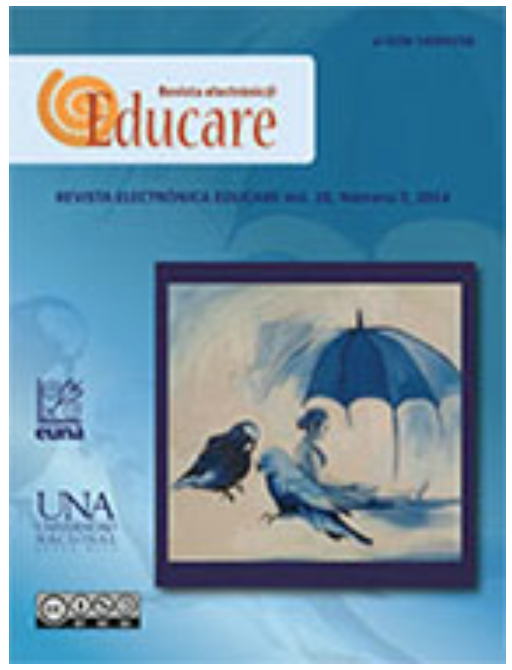Healthy Pedagogy: Awakening of a New Node
DOI:
https://doi.org/10.15359/ree.18-2.16Keywords:
Pedagogy, life, health, education, holistic, node, coexistence, care, respect, Mother Earth.Abstract
This paper intends to recover a pedagogic vision in life, as an experience and a process that dignifies joy, love, ecology, leisure, freedom and hope, as options that enable routes for a pedagogic project that generates health. The theoretical position is assumed as a holistic paradigm to conclude that the planetary crisis, that generates serious and persistent health problems at personal, social, and worldwide levels, can be modified using a healthy pedagogy which constitutes a creative, loving and hopeful challenge for the cohabitation of diverse life forms. The term “Healthy Pedagogy” rises from the need to establish a dialogical relationship between pedagogy and health, based on renewed visions that lead to the rising of a new node. Both the right to health and the right to education are usually understood as independent from each other. However, the intersection between them can signify a great challenge and an important revelation.
References
Assmann, H. (2002). Placer y ternura en la educación. Madrid: Narcea.
Boff, L. (2013). El arte de cuidar a los enfermos. Recuperado de http://www.servicioskoinonia.org/boff/articulo.php?num=572
Capra, F. (1996). El punto crucial ciencia, sociedad y cultura naciente. Buenos Aires: Estaciones.
Chamorro, Y. G. (2010). Educación para la salud en las organizaciones escolares. Educación, 19(36), 7-19. Recuperado de http://revistas.pucp.edu.pe/index.php/educacion/article/view/2595/2543
Devereux, P., Steele, J. y Kubrin, D. (1991). GAIA la tierra inteligente. Barcelona: Martínez Roca Ediciones.
Dossey, L. (1999). Tiempo, espacio y medicina (3ª ed.). Barcelona: Kairós.
Dossey, L. (2004). El poder curativo de la mente. La salud más allá del cuerpo. México: Santillana.
Flores, L. E., Flores, G., Jiménez, R., Madrigal. J. C., Perearnau, M. A. (2009). Comunidad aprendiente. Costa Rica: Artemusa.
Gutiérrez, F. (1981). Educación como praxis política. México: Siglo XXI Editores.
Hay, L. L. (2011). Tú puedes sanar tu vida. México, DF: Diana.
López, V. (1996). Hacia una escuela saludable. Revista Alambique 9. Recuperado de http://alambique.grao.com/revistas/alambique/009-educacion-para-la-salud/libros-hacia-una-escuela-saludable
Maturana, H. (1999). Transformación en la Convivencia. Chile: Dolmen Ediciones.
Maturana, H. (2001). Emociones y lenguaje en educación y política. Santiago: Dolmen.
Maturana, H. y Pörksen, B. (2004). Del ser al hacer. Los orígenes de la biología del conocer. Santiago: LOM.
Morin, E. (2001). Los siete Saberes necesarios para la educación del futuro. Barcelona: Paidós.
Payán, J. C. (2000). Lánzate al vacío. Se extenderán tus alas. Bogotá: McGraw-Hill.
Pearsall, P. (1998). La salud por el placer. Cómo equilibrar en tu vida amor, trabajo y diversión. Madrid: Edaf.
Universidad Nacional (UNA). (2008). Modelo pedagógico de la Universidad Nacional. Heredia, Costa Rica. Recuperado de http://www.documentos.una.ac.cr/bitstream/handle/unadocs/1763/modelo_pedagogico_UNA.141.pdf?sequence=3
Universidad Nacional. (2012a). Plan de mediano plazo 2013-2017 “Fortaleciendo el modelo de gestión”. Heredia, Costa Rica: Programa de publicaciones e impresiones de la Universidad Nacional. Recuperado de http://es.scribd.com/doc/164153006/1201-12-Plan-de-Mediano-Plazo-2013-2017
Universidad Nacional. (2012b). Plan Estratégico del CIDE 2013-2017. Centro de Investigación y Docencia en Educación. Heredia, Costa Rica.
Downloads
Published
How to Cite
Issue
Section
License
1. In case the submitted paper is accepted for publication, the author(s) FREELY, COSTLESS, EXCLUSIVELY AND FOR AN INDEFINITE TERM transfer copyrights and patrimonial rights to Universidad Nacional (UNA, Costa Rica). For more details check the Originality Statement and Copyright Transfer Agreement
2. REUTILIZATION RIGHTS: UNA authorizes authors to use, for any purpose (among them selfarchiving or autoarchiving) and to publish in the Internet in any electronic site, the paper´'s final version, both approved and published (post print), as long as it is done with a non commercial purpose, does not generate derivates without previous consentment and recognizes both publisher's name and authorship.
3. The submission and possible publication of the paper in the Educare Electronic Journal is ruled by the Journal’s editorial policies, the institutional rules of Universidad Nacional and the laws of the Republic of Costa Rica. Additionally, any possible difference of opinion or future dispute shall be settled in accordance with the mechanisms of Alternative Dispute Resolution and the Costa Rican Jurisdiction.
4. In all cases, it is understood that the opinions issued are those of the authors and do not necessarily reflect the position and opinion of Educare, CIDE or Universidad Nacional, Costa Rica. It is also understood that, in the exercise of academic freedom, the authors have carried out a rogorous scientific-academic process of research, reflection and argumentation thar lays within the thematic scope of interest of the Journal.
5. The papers published by Educare Electronic Journal use a Creative Commons License:














 The articles published by Educare Electronic Journal can be shared with a Creative Commons License:
The articles published by Educare Electronic Journal can be shared with a Creative Commons License: 



